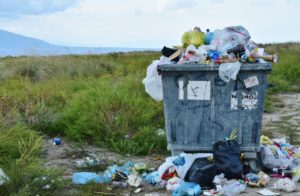Single use plastics…a bigger problem than ever…
 Back in the day, when people talked about a multitude of things, there was a conversation beginning to spread out from the chattering classes to substantial swathes of Joe and, especially, Jane Public.
Back in the day, when people talked about a multitude of things, there was a conversation beginning to spread out from the chattering classes to substantial swathes of Joe and, especially, Jane Public.
It was inspired and fuelled by a number of well-known broadcasters, and it was about plastic, specifically the one-trip single-use kind we had grown to take for granted over the second half of the twentieth century and beyond, barely noticing, most of us, how many single-use plastics we were using and, more to the point, how we were disposing of them.
Who knew that there was so much plastic floating in the sea, or that it could break down into tiny fragments and prove irresistible, and irresistibly damaging, to so much marine life? What to do? Nothing was not an option.
Then along came a strikingly nasty coronavirus and its resulting disease Covid-19, and everything changed. Out went the conversation about single-use plastic and the evils thereof, and in came single-use face masks, gloves and even capes at the hairdressers (when there were hairdressers) with the catch-all designation of PPE to make it alright. Never mind that washable fabric robes or capes had been perfectly acceptable at the hairdressers since time immemorial, suddenly they are too dangerous and must be replaced with plastic ones that you use only once and then throw away to avoid infection.
That’s alright, then, they’re PPE, so not, of course, dangerous, are they?
So it is that, little by little, as we win the war against Covid-19, we lose it against plastic pollution. To set against the imperceptibly slow replacement of non-recyclable plastic wrappings, for instance, with bio-degradable alternatives, we have an unexpected extra mountain to deal with in the form of single-use PPE.
Who was thinking about the ultimate disposal of it when the world went into panic mode last year and production of it soared? If governments and local authorities were, they kept it very quiet.
What adds to the frustration about single use plastics, for example wrappings on fresh produce, is that versions which are much more environmentally friendly exist and are in widespread use – not only moderately environmentally friendly bags which can be recycled in some places and by some local authorities, but much more environmentally friendly biodegradable and compostable wrappings.
 The context in which some biodegradable wrappers are used plainly shows that such materials cannot be so prohibitively expensive to produce as to be an unviable alternative to the more polluting variety; with the necessary expansion in production that could follow a ban on the production and use of the worst kinds of single-use wrappings, a real blow could be struck for the benefit of the environment.
The context in which some biodegradable wrappers are used plainly shows that such materials cannot be so prohibitively expensive to produce as to be an unviable alternative to the more polluting variety; with the necessary expansion in production that could follow a ban on the production and use of the worst kinds of single-use wrappings, a real blow could be struck for the benefit of the environment.
Which is where governments have to come in, in establishing the infrastructure, and local authorities have to get their acts together and streamline policies and facilities so that, from the Isles of Scilly to Shetland, best practice becomes the norm for all.
The environmental engineers and scientists know what is required and how to do it.
What we must not do is export our waste elsewhere – we create the problem, we must deal with it. That would go a long way in concentrating the mind on real and sustainable waste reduction measures.

